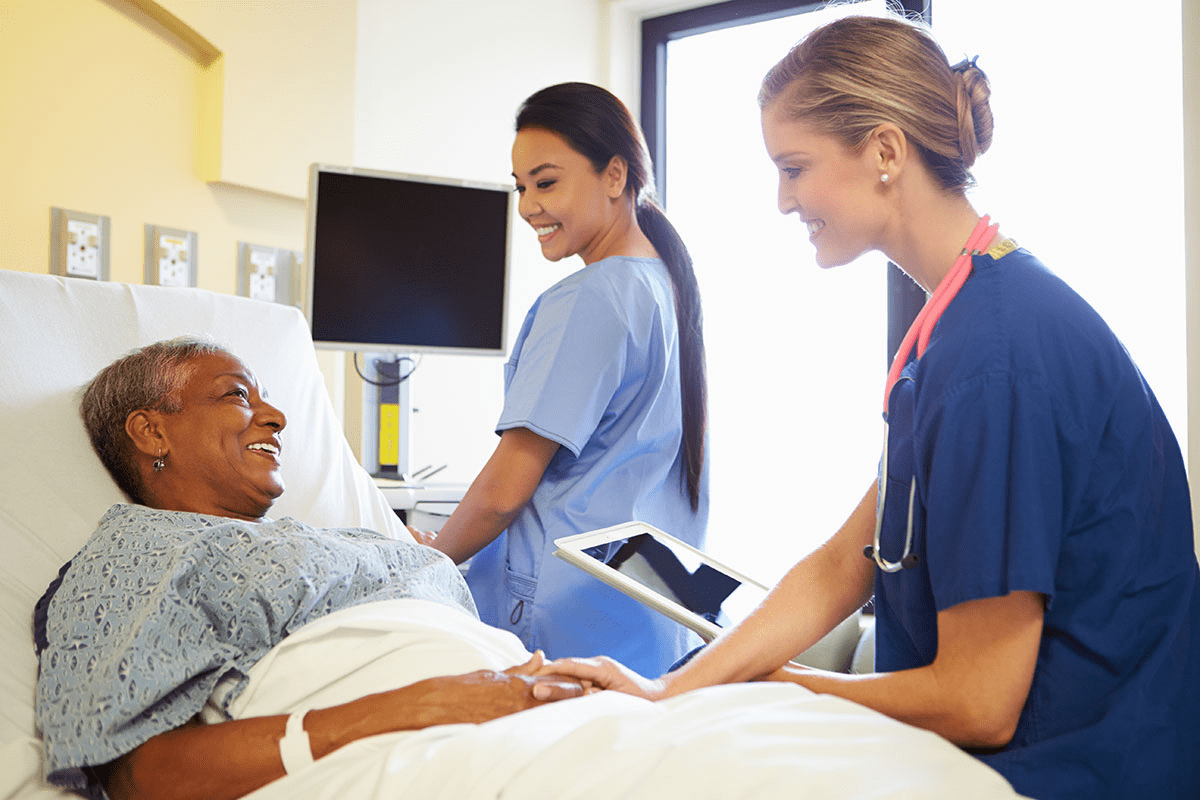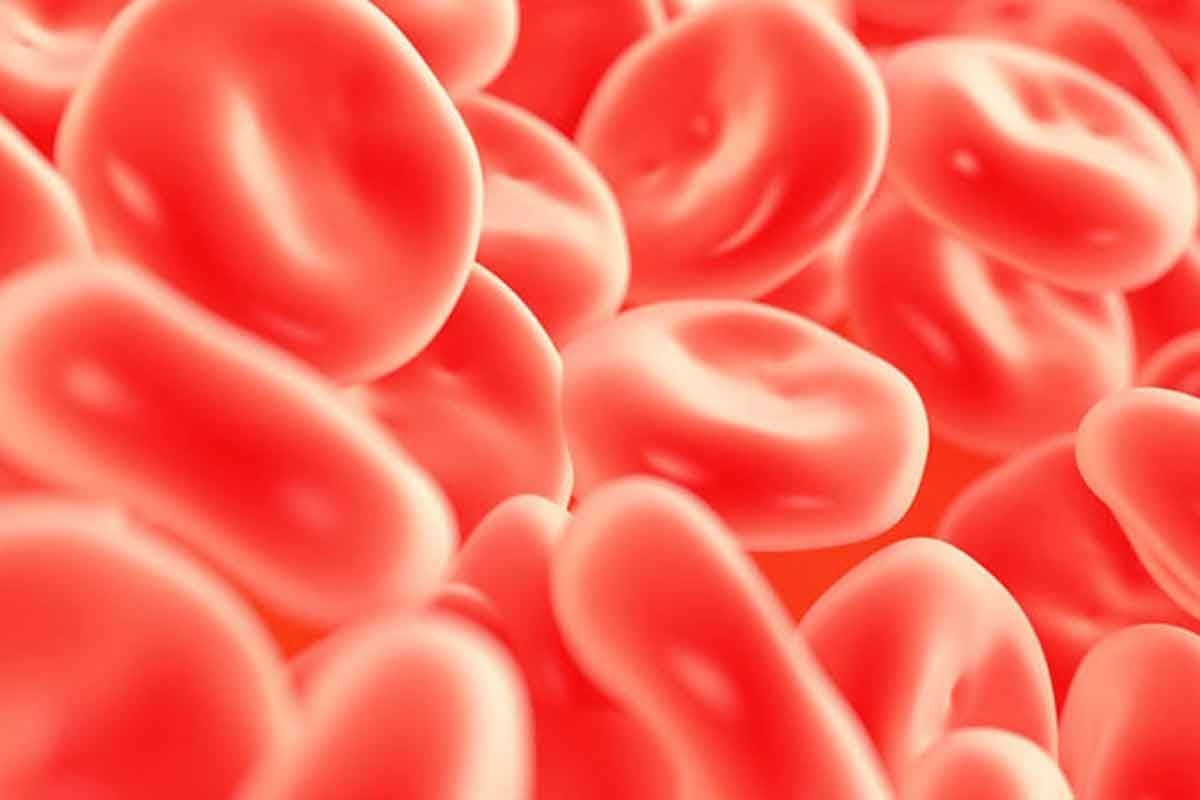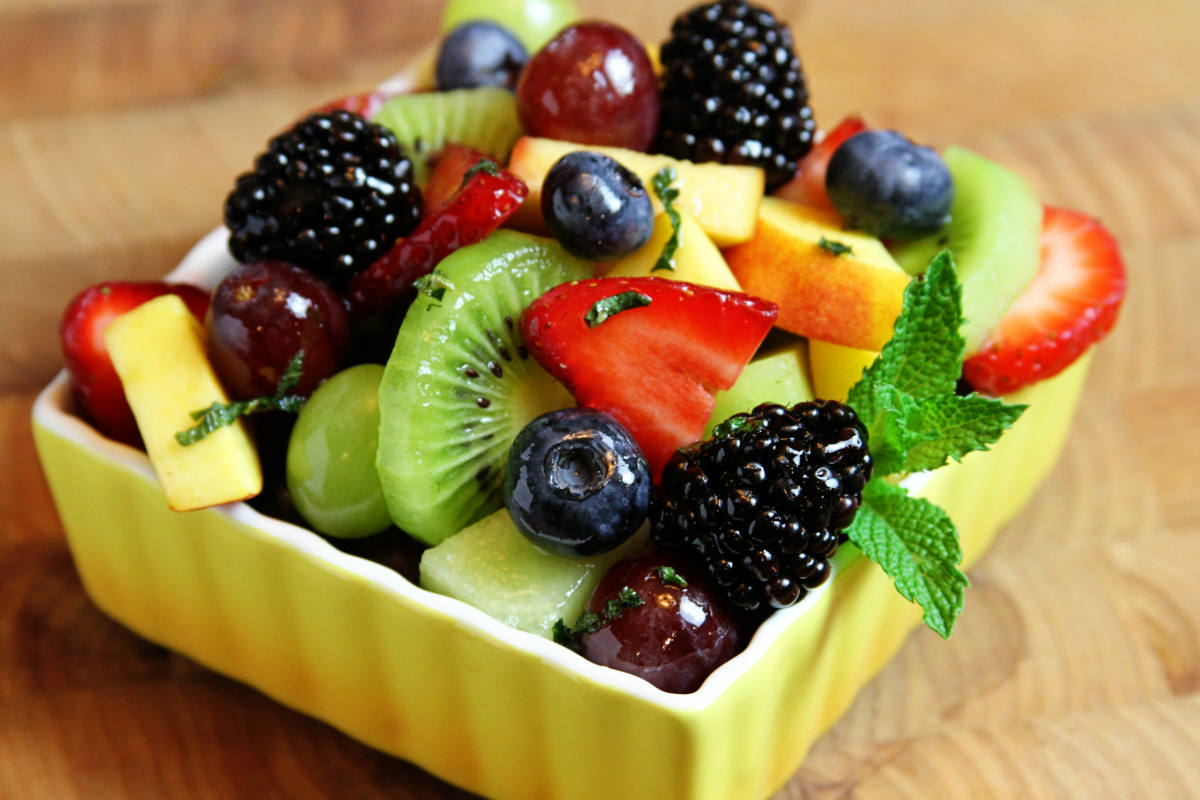Last Updated on November 26, 2025 by Bilal Hasdemir
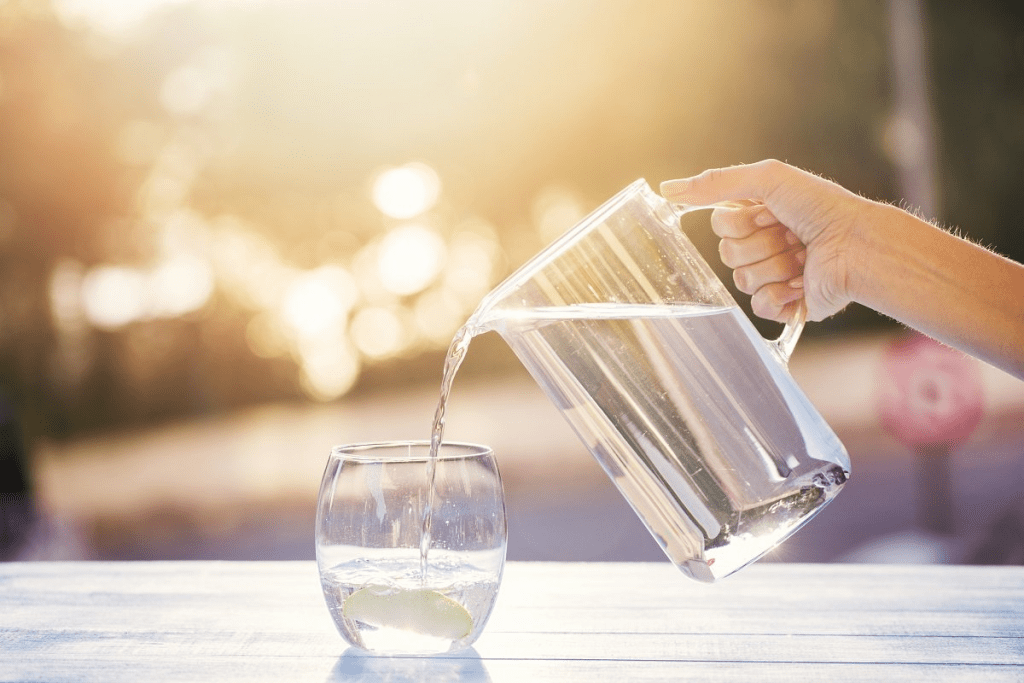
bloating from chemo treatment
Chemotherapy is a common way to fight cancer by using drugs to kill cancer cells. But, it can cause side effects like bloating. It’s important for patients to manage these side effects well.Bloating from chemo treatment can improve with hydration. Learn how water helps flush toxins and ease discomfort.
Staying hydrated is key when you’re getting chemotherapy. It helps your body recover. Drinking water is often suggested to help get rid of bloating from chemo treatment. This article will look into how staying hydrated can help with chemo-induced bloating relief. We’ll also share tips on dealing with bloating and other side effects.
Key Takeaways
- Hydration plays a crucial role in managing side effects during chemotherapy.
- Drinking water can help reduce bloating caused by chemotherapy.
- A well-hydrated body can recover faster from chemotherapy sessions.
- Managing bloating involves a combination of hydration and dietary adjustments.
- Patients should consult their healthcare provider for personalized advice on managing chemotherapy side effects.
The Relationship Between Hydration and Chemotherapy
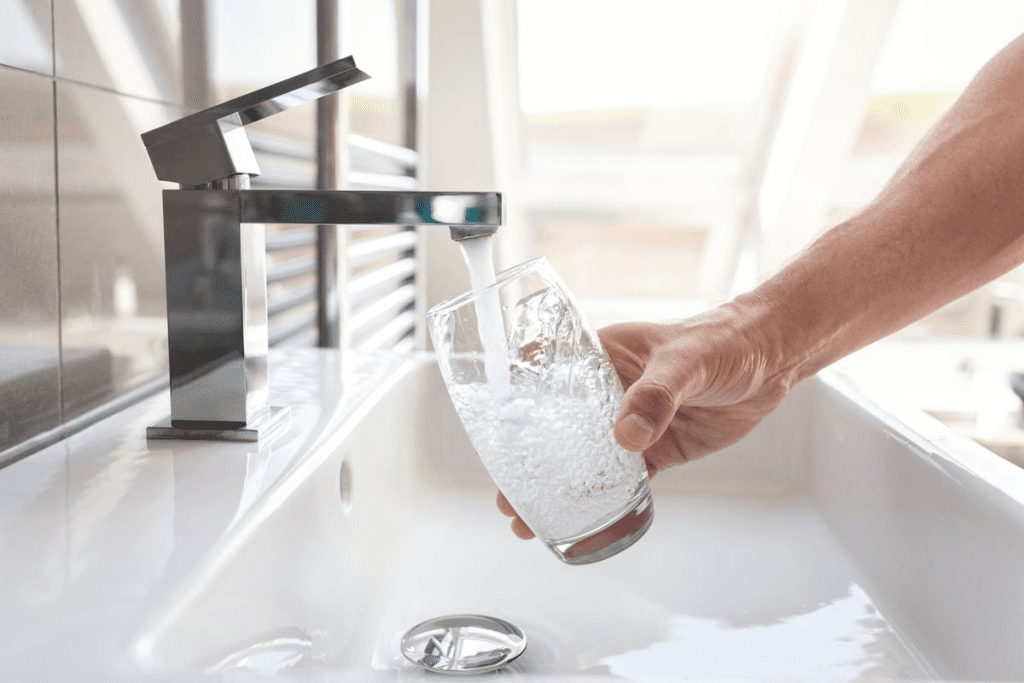
hydration and chemotherapy
Hydration is key when the body fights off chemotherapy. It affects how well the treatment works and its side effects. Knowing this link is crucial for those going through treatment.
How Chemotherapy Affects the Body’s Hydration Needs
Chemotherapy drugs can really mess with how much water our bodies hold. Chemotherapy-induced vomiting and diarrhea are common and can cause dehydration. Some drugs also make us retain water, leading to swelling and discomfort. It’s important for patients to watch out for these side effects to stay hydrated.
The Science Behind Chemotherapy Elimination from the Body
Our bodies can get rid of chemotherapy drugs better with enough water. Adequate hydration helps remove toxins from chemotherapy, which can lessen side effects. The kidneys are key in this process, filtering out drugs and their waste. So, keeping the kidneys working well with enough water is vital.
In summary, the link between hydration and chemotherapy is complex. By understanding how chemotherapy impacts hydration and how it’s eliminated, patients can manage their treatment better. This might even help improve their results.
Understanding Bloating from Chemo Treatment
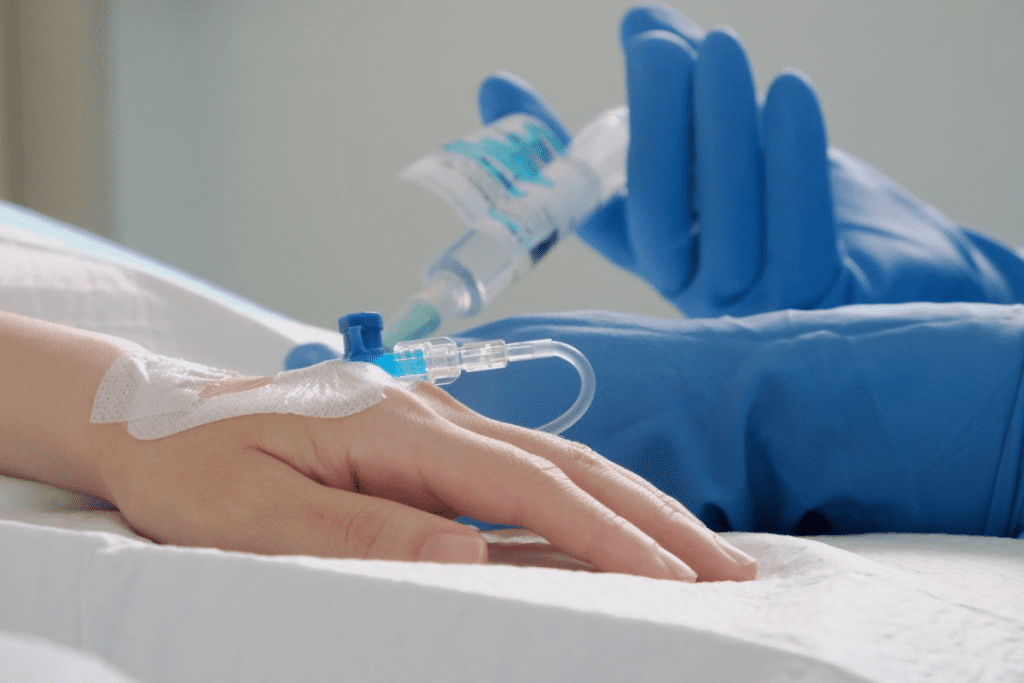
chemotherapy-induced bloating
Chemotherapy-induced bloating is a big worry for cancer patients. It affects their well-being a lot. Knowing why and how bloating happens is key to handling it better.
Common Causes of Chemotherapy-Induced Bloating
Bloating from chemo comes from a few reasons. Chemotherapy drugs can make bowel movements slow, leading to constipation. This is a big reason for bloating. Also, some chemo drugs cause fluid retention, making bloating worse. Hormonal changes and some chemo meds can also add to it.
Chemo can change the digestive system, causing gas. This leads to discomfort and bloating. Knowing these causes helps patients manage their symptoms better.
How Bloating Affects Cancer Patients’ Quality of Life
Bloating can really change cancer patients’ lives. It can make eating and staying strong hard during treatment. The emotional side of bloating is also big; it can cause anxiety and distress.
| Aspect of Life | Impact of Bloating |
| Physical Comfort | Discomfort, pain, and difficulty in movement |
| Nutrition and Appetite | Reduced appetite, difficulty in eating |
| Emotional Well-being | Increased anxiety, distress |
Knowing why and how bloating happens is the first step to dealing with it. By understanding the causes and effects, healthcare and patients can work together to lessen this side effect.
How Water Helps Flush Chemotherapy Out of Your Body
hydration and chemotherapy clearance
Staying hydrated is key for health, especially when we’re getting chemotherapy. Drinking lots of water helps get rid of toxins and aids digestion.
The Mechanics of Drug Elimination Through Hydration
Chemotherapy drugs go into our blood, spreading through our body. Our kidneys filter these drugs and their leftovers out of our blood. Drinking enough water helps our kidneys work best, making sure toxins are removed.
Drinking water helps our kidneys do their job. They filter our blood to remove waste and extra stuff, sending it out in our urine. This keeps our urine concentrated and stops toxins from building up in our body.
Key aspects of hydration in chemotherapy:
- Enhances kidney function
- Helps in eliminating toxins
- Supports overall bodily functions during treatment
Research on Hydration and Chemotherapy Clearance
Studies have looked into how hydration affects chemotherapy. They found that enough water helps get rid of chemotherapy drugs faster. This can lower side effects and improve treatment results.
“Adequate hydration is crucial for patients undergoing chemotherapy, as it aids in the elimination of drugs and their metabolites, potentially reducing toxicity and improving treatment efficacy.”
Nutrition and Cancer Journal
A study in a top cancer research journal showed that drinking a lot of fluids during chemo led to better drug removal and less toxicity.
| Hydration Level | Drug Clearance Rate | Toxicity Levels |
| Adequate | High | Low |
| Inadequate | Low | High |
Balancing Hydration with Electrolytes During Treatment
Hydration is important, but so is balancing it with electrolytes. Electrolytes like sodium, potassium, and chloride are crucial for nerve and muscle function, hydration, and pH balance.
During chemo, keeping the right balance of electrolytes is key. Too little can cause muscle cramps, fatigue, and other issues.
Tips for balancing hydration and electrolytes:
- Monitor electrolyte levels regularly
- Consume electrolyte-rich foods or supplements as recommended by your healthcare provider
- Adjust fluid intake based on activity level and climate
Best Practices for Hydration During Chemotherapy
hydration during chemotherapy
Staying hydrated is key for those going through chemotherapy. It helps your body handle the treatment better. This reduces the chance of complications and eases some side effects.
Recommended Daily Water Intake for Chemo Patients
The right amount of water for chemo patients varies. It depends on age, health, and the treatment type. Older adults should drink a lot because their kidneys work differently and they might not feel thirsty as much.
Most doctors suggest drinking eight to ten glasses of fluid daily. But, it’s important to talk to your doctor. They can tell you how much water is best for you.
Best Water to Drink During Chemo
Not all water is good for chemo patients. Filtered or purified water is best. It has fewer contaminants than tap water.
- Use a water filter at home to clean the water.
- Choose bottled water from a trusted source if needed.
Timing Your Water Consumption Around Treatments
When you drink water matters during chemo. Drink water before treatment to stay hydrated. But, don’t drink too much right before to avoid discomfort during the treatment.
“Hydration is key, but it’s also about when you hydrate. Drinking water at the right times can make a significant difference in how you feel during and after chemotherapy.”
An Oncologist
Drink water all day, not just in big gulps. This keeps your body hydrated evenly.
Why No Cold Drinks During Chemo: Understanding Temperature Sensitivity
temperature sensitivity during chemo
Chemotherapy can change how our bodies handle temperature, especially cold drinks. This makes cold drinks hard for patients to handle during treatment.
How Cold Sensitivity Develops During Treatment
Cold sensitivity during chemo is linked to the drugs used and their impact on nerves. Some drugs can damage nerves, causing numbness or tingling. They also change how we feel temperature.
This nerve damage makes the cold feel more intense. So, patients might not like cold drinks during and after treatment.
Alternatives to Cold Beverages That Provide Hydration
There are ways to stay hydrated without cold drinks. Room temperature or warm drinks work well for hydration.
Try herbal teas, warm water with lemon, or electrolyte-rich drinks that aren’t cold. These options help keep you hydrated without the discomfort of cold.
Managing Temperature Preferences Throughout Treatment Cycles
It’s important to know how your body reacts to temperature and choose drinks that feel right. Staying hydrated is key, but comfort matters too.
Experiment with different temperatures to find what works for you at each treatment stage. Keeping a hydration journal can help you track what’s best for you.
Managing Bloating from Chemo Treatment Through Proper Hydration
hydration strategies for bloating relief
For those going through chemotherapy, drinking enough water is key to reducing bloating. Bloating is a common and uncomfortable side effect. Staying hydrated is essential in managing it.
Water helps keep digestion healthy, which can be tough during chemo. When we drink enough, our body can better digest food and get rid of waste. This can help lower bloating.
How Water Intake Affects Digestive Function During Chemotherapy
Chemotherapy can mess with our digestive system, causing constipation or diarrhea. These issues can lead to bloating. Drinking water helps prevent constipation by making stool softer and promoting regular bowel movements.
Water also helps digest food and absorb nutrients, which can be tough during chemo. Drinking enough water makes our digestive system work better. This can reduce bloating and discomfort.
Hydration Strategies Specifically for Bloating Relief
To fight bloating with hydration, drink water all day long. Aim for at least eight glasses a day, but it depends on your needs and activity level. Your chemo treatment also plays a role.
- Drink water at room temperature, as very cold water can cause stomach cramps.
- Sip water throughout the day rather than gulping it down at once.
- Monitor your body’s response to hydration and adjust your water intake accordingly.
- Incorporate hydrating foods into your diet, such as watermelon and cucumbers.
By following these hydration tips, chemo patients might feel less bloated. Always talk to your healthcare provider for advice on managing chemo side effects.
Dietary Approaches to Reduce Chemo-Induced Bloating
dietary approaches to reduce chemo-induced bloating
A well-planned diet is key to easing bloating from chemotherapy. By choosing the right foods, patients can lessen digestive problems linked to their treatment.
Anti-Inflammatory Foods That Combat Bloating
Adding anti-inflammatory foods to your diet can fight bloating. These include:
- Leafy Greens like spinach and kale, full of antioxidants.
- Berries such as blueberries and raspberries, with strong anti-inflammatory effects.
- Fatty Fish like salmon, packed with omega-3 fatty acids.
- Whole Grains that are high in fiber, aiding digestion.
Foods to Avoid When Experiencing Chemo Bloating
Some foods can make bloating worse and should be limited or avoided. These include:
- Carbonated Drinks that can cause gas.
- High-Fiber Foods that, while good, can be uncomfortable during chemo.
- Legumes like beans and lentils, which can produce gas.
- Processed Foods that are high in salt and preservatives.
Meal Planning Tips for Minimizing Digestive Discomfort
Good meal planning can reduce digestive issues. Tips include:
- Eating smaller, more frequent meals to ease digestion.
- Avoiding foods that are high in fat or heavily spiced.
- Incorporating foods that are easy to digest, such as bananas and rice.
- Staying hydrated by drinking plenty of water.
By following these dietary tips, patients can manage bloating better and feel more comfortable during chemotherapy.
Natural Remedies for Easing Chemo Bloating
Many cancer patients face the problem of bloating from chemotherapy. But, there are natural ways to help. Bloating can make you feel uncomfortable and affect your mood. Luckily, there are several natural methods to ease this symptom.
Herbal Teas and Supplements (With Medical Approval)
Some herbal teas and supplements can help with bloating. Ginger tea is great for digestion and can lessen nausea and bloating. Peppermint tea also helps with digestive issues. But, always talk to a doctor before trying new supplements, as they might affect your treatment.
- Ginger tea for digestive benefits
- Peppermint tea to ease digestive discomfort
- Probiotics to support gut health
Gentle Movement and Exercise Options
Doing gentle exercises can help with digestion and bloating. Yoga and short walks are good choices. These activities not only help with symptoms but also reduce stress and boost your mood. It’s important to pick exercises that are safe and comfortable while you’re on chemotherapy.
- Yoga to improve flexibility and reduce stress
- Short walks to stimulate digestion
- Stretching exercises to relieve discomfort
Relaxation Techniques to Reduce Bloating Discomfort
Stress can make bloating worse. That’s why relaxation techniques are so helpful. Deep breathing exercises, meditation, and progressive muscle relaxation can help manage stress and reduce bloating. These methods are easy to do at home and can help you relax.
- Deep breathing exercises to reduce stress
- Meditation to promote relaxation
- Progressive muscle relaxation to alleviate discomfort
By using these natural remedies, patients can find relief from bloating. This can improve their quality of life during treatment.
What to Expect at Your First Chemotherapy Treatment
Your first chemotherapy session is a big step in fighting cancer. Knowing what to expect can help you feel less anxious. It’s important to understand the process and how to stay comfortable.
Preparation Tips for Your First Session
Getting ready for your first chemotherapy session is key. Arrive 15 minutes early to fill out any paperwork. Having a friend or family member with you can also help.
Additional preparation tips include:
- Bring a list of your medications and any questions for your healthcare provider
- Learn about your chemotherapy regimen, including the drugs and possible side effects
- Make sure you have a way to get to and from the treatment center, as you might not feel up to driving
What to Wear to Chemo Appointments
Wearing comfortable clothes is important during chemotherapy. Choose loose, easy-to-move-in clothes that let you access your arm for the IV. Wearing layers is also a good idea, as the room’s temperature can change.
Consider wearing clothing with:
- Short sleeves or sleeves that can be easily rolled up
- Soft, breathable fabrics
- Minimal jewelry to avoid any discomfort or complications during treatment
Items to Bring for Comfort and Hydration
Bringing certain items can make your treatment more comfortable. Bring a water bottle to stay hydrated, a book or tablet for fun, and a blanket or pillow for comfort. Snacks are also good, but check with your healthcare provider about any food restrictions.
Some essentials to pack include:
- A refillable water bottle
- Entertainment such as books, tablets, or portable games
- Comfort items like a favorite blanket or pillow
- Snacks, such as nuts, fruits, or energy bars
Tips for Managing Weight Changes During Chemotherapy
Keeping a healthy weight during chemotherapy is key for recovery and comfort. Chemotherapy can lead to big weight changes, affecting health and happiness. We’ll look at why this happens and share tips to manage it.
Understanding Weight Gain During Chemo
Weight gain from chemotherapy comes from many sources. These include more hunger, water retention, and metabolism changes. Some chemo meds make you want to eat more, especially high-calorie foods. Also, treatments can make your body hold onto water, causing weight gain.
To control weight gain, eat a balanced diet with lots of fruits, veggies, and lean proteins. Avoid high-calorie snacks and sugary drinks. Regular exercise, like walking, helps keep a healthy weight and boosts well-being.
Addressing Unintended Weight Loss
Unintended weight loss during chemo is tough too. Nausea, vomiting, and taste or appetite changes can cause it. To fight weight loss, eat smaller, more frequent meals to manage nausea and keep nutrition up.
Increasing calorie intake with nutrient-rich foods is also helpful. Foods like nuts, avocados, and full-fat dairy products can help gain or keep weight. Drinking plenty of water or other hydrating fluids is also key.
How Hydration Affects Weight Management During Treatment
Hydration is vital for managing weight during chemo. It helps with metabolism and digestion. Even a little dehydration can make you tired, which hurts physical activity and weight management.
- Drink at least 8-10 glasses of water per day.
- Incorporate hydrating foods like watermelon and cucumbers into your diet.
- Avoid caffeinated and carbonated beverages that can lead to dehydration.
By knowing why weight changes happen during chemo and using these tips, patients can manage their weight better. This improves their quality of life during treatment.
Chemotherapy-Related Nausea and Vomiting: Hydration Strategies
Nausea and vomiting are tough side effects of chemotherapy. They can make patients feel dehydrated and uncomfortable. It’s important to manage these symptoms to keep patients’ quality of life high during treatment.
How Dehydration Worsens Nausea Symptoms
Dehydration makes nausea symptoms worse, creating a tough cycle. When we lose fluids, our blood volume goes down. This can hurt our kidneys and lead to toxin buildup. It’s key to stay hydrated to avoid this.
Maintaining fluid balance is crucial. Even a little dehydration can cause a lot of discomfort. Drinking enough water is vital to manage nausea.
Techniques for Maintaining Hydration When Nauseated
It’s hard to stay hydrated when you’re nauseous, but there are ways to do it. Drinking small amounts of fluid often is easier than drinking a lot at once. Also, choosing drinks with electrolytes can help replace lost salts.
- Sipping on clear broths or electrolyte-rich drinks
- Eating hydrating foods like watermelon or cucumbers
- Avoiding caffeinated or carbonated beverages that can irritate the stomach
Drinking fluids at room temperature is also helpful. Cold or hot drinks can sometimes make nausea worse.
Working with Your Doctor on Anti-Nausea Protocols
Managing nausea from chemotherapy needs teamwork between patients and doctors. Talking to your doctor about your nausea can help create a plan just for you.
Medications and alternative therapies can help with nausea. It’s best to work with your oncology team to find the right approach for you.
Things Not to Do While on Chemotherapy
To do well with chemotherapy, knowing what to avoid is key. It’s as important as knowing what to expect. Chemotherapy affects many parts of life, like diet, activities, and what substances to use.
Dietary Restrictions During Treatment
Following a special diet is crucial during chemotherapy. Some foods can react badly with treatment or make side effects worse. For example, grapefruit or its juice can mess with how the body handles some drugs.
It’s also wise to cut down on foods high in sugar, salt, and unhealthy fats. These can make nausea and tiredness worse. Foods that might cause infections, like raw meats and unpasteurized dairy, should also be avoided.
Activities to Limit or Modify
Exercise is good for those on chemotherapy, but some activities need to be careful. For instance, those with low blood counts should stay away from sports that could cause bleeding.
Also, avoid extreme temperatures. Chemotherapy can make it hard for the body to keep a steady temperature. This means no very hot showers or cold environments.
- Avoid heavy lifting or bending to prevent strain.
- Modify exercise routines to low-impact activities like walking or yoga.
- Be cautious with activities that could lead to injury, such as those involving sharp objects.
Substances Chemotherapy Patients Should Avoid
Some substances can mess with chemotherapy or make side effects worse. Alcohol is one; it can make nausea and dehydration worse.
Be careful with over-the-counter meds and supplements too. They can interact with chemotherapy. Always check with your doctor before trying new things.
Smoking and tobacco products are also a no-go. They can make chemotherapy less effective and harm your health more.
Can You Drink Alcohol During Chemotherapy?
It’s important for patients to know how alcohol affects chemotherapy. Chemotherapy is a complex treatment that needs careful attention to diet, hydration, and lifestyle. Many wonder if it’s safe to drink alcohol during this time.
Effects on Chemotherapy Efficacy
Alcohol can interact with chemotherapy drugs, changing how well they work and their side effects. Drinking alcohol can make chemotherapy less effective or increase its side effects. For example, some chemotherapy drugs react with alcohol like antibiotics do.
“Drinking alcohol during chemotherapy can make side effects worse, like nausea and fatigue,” a study in an oncology journal found. The impact can differ based on the chemotherapy type, alcohol amount, and individual factors.
Guidelines for Drinking During Treatment
While it’s usually advised to avoid alcohol during chemotherapy, there might be times when a little is okay. It’s key to follow your healthcare provider’s advice. They can give personalized guidance based on your situation and treatment.
- Limit alcohol to special occasions, if your doctor says it’s okay.
- Choose drinks with less alcohol.
- Be aware of increased sensitivity to alcohol during treatment.
Discussing Alcohol Use with Your Oncology Team
Talking openly with your oncology team about alcohol is crucial. Patients should share their alcohol habits to ensure safety during treatment. The team can advise on safe alcohol use and how to reduce risks.
“It’s vital for patients to be honest about their alcohol use so we can give the best care and reduce treatment risks,” a medical oncologist emphasizes.
By knowing the risks and following healthcare advice, patients can make smart choices about alcohol during chemotherapy.
Conclusion: Balancing Hydration for Comfort and Recovery During Cancer Treatment
Adequate hydration supports kidney function and reduces side effects for managing side effects and aiding in recovery during cancer treatment. We’ve seen how balancing hydration can greatly improve patient comfort and outcomes. Water helps remove chemotherapy agents from the body, lowering the chance of side effects and boosting overall health.
Patients can play a big role in their care by focusing on hydration. This means staying hydrated, avoiding cold drinks, and eating anti-inflammatory foods. It’s more than just drinking water; it’s about a whole approach to handling chemotherapy side effects.
Hydration is key in reducing symptoms like bloating and nausea. By following the tips in this article, patients can make their treatment journey easier. We urge patients to work with their healthcare team to create a hydration plan that meets their specific needs during this tough time.
FAQ
Does drinking water help flush out chemotherapy from the body?
Yes, drinking water helps get rid of chemotherapy drugs. It supports the kidneys and keeps the body hydrated.
Why is hydration important during chemotherapy?
Hydration is key during chemotherapy. It helps the body recover, manage side effects, and remove drugs.
How much water should I drink during chemotherapy?
Drink at least 8-10 glasses of water a day. Adjust based on your activity level and needs.
Why are cold drinks not recommended during chemotherapy?
Cold drinks are not good because chemotherapy can make you sensitive to cold. They might be uncomfortable or even painful.
Can I drink alcohol during chemotherapy?
It’s best to avoid or limit alcohol during treatment. It can affect how well the treatment works and make side effects worse. Talk to your oncology team about it.
How can I manage bloating caused by chemotherapy?
To manage bloating, stay hydrated and eat a balanced diet. Avoid foods that trigger bloating. Try anti-inflammatory foods and relaxation techniques too.
What are some dietary approaches to reduce chemo-induced bloating?
Eat small, frequent meals. Avoid foods high in fiber or gas. Include anti-inflammatory foods to help reduce bloating.
How can I stay hydrated if I’m experiencing nausea during chemotherapy?
To stay hydrated when nauseous, sip fluids slowly. Choose drinks with electrolytes. Take anti-nausea meds as your doctor advises.
What should I expect during my first chemotherapy treatment?
Expect a consultation, treatment prep, and chemotherapy during your first session. Bring items for comfort and hydration.
How can I manage weight changes during chemotherapy?
Understand why you’re gaining or losing weight. Eat a balanced diet and stay hydrated. Talk to your healthcare provider about any concerns.
Are there any natural remedies for easing chemo-induced bloating?
Yes, try herbal teas, gentle exercises, and relaxation techniques. They can help with bloating. Always check with your healthcare provider first.
What activities should I limit or avoid during chemotherapy?
Avoid activities that increase infection, injury, or fatigue risks. Talk to your healthcare provider about any specific concerns or limitations.
How does dehydration worsen nausea symptoms during chemotherapy?
Dehydration makes nausea worse by concentrating chemotherapy drugs. It also reduces digestive efficiency and increases discomfort.
What type of water is best to drink during chemotherapy?
Drink clean, filtered water. Some prefer electrolyte-rich beverages or water at a comfortable temperature.
How does hydration affect weight management during chemotherapy?
Hydration is key for weight management during chemotherapy. It supports metabolism, helps manage hunger, and prevents dehydration-related weight loss.
References
Sikking, C., et al. (2023). Hydration Methods for Cisplatin Containing Chemotherapy. PMC. https://www.ncbi.nlm.nih.gov/pmc/articles/PMC10836314/



